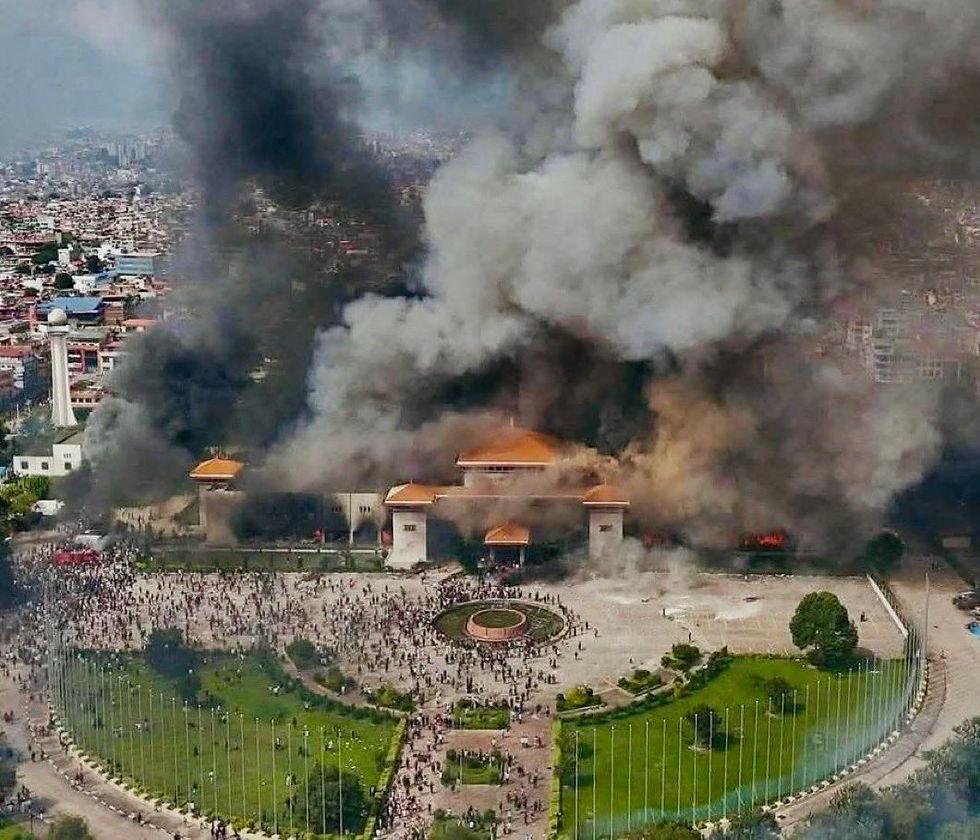Nepal’s Gen Z Protests: Government Up In Flames
- CP Blogs
- Sep 9, 2025
- 2 min read

Nepal has been shaken by a wave of youth-led protests, sparked by a controversial social media ban and deepened by decades of frustration over corruption and nepotism. The demonstrations have already led to Prime Minister Oli’s resignation, the ouster of CDC-equivalent leadership, and, tragically, nearly 20 protester deaths.
While the crisis reveals the consequences of governments putting themselves above their citizens, it also raises a difficult truth: change must never come at the expense of innocent families or communities. Accountability matters—but so does how it’s pursued.
What Happened In Nepal
Social media ban sparks revolt: Young people, particularly Gen Z, took to the streets after platforms were restricted and “nepo kids” (politically connected elites) continued to dominate government opportunities.
Escalation & resignation: The protests swelled, leading to widespread clashes with police and the eventual resignation of Prime Minister K.P. Oli.
Tragic toll: At least 19 protestors were killed, hundreds more injured, and government offices paralyzed amid resignations and internal revolt.
International concern: Reports from Time, Reuters, and The Financial Times describe “rare bipartisan alarm” inside Nepal, reflecting how deeply the unrest has shaken confidence in governance.
Why It Happened
This eruption didn’t come out of nowhere. It reflects years of:
Corruption & nepotism — leadership positions going to politically connected families rather than based on merit.
Economic stagnation — young people struggling with unemployment and limited opportunity.
Distrust in institutions — the sense that government serves itself before its people.
The social media ban was only the spark. The fire had been building for years.
The Human Cost
The tragedy of Nepal’s crisis isn’t only political—it’s human. Protestors, many of them students and young workers, have lost their lives. Families of government officials are facing threats and reprisals. A nation already struggling with instability is bleeding talent, trust, and hope.
This is a stark reminder: reform cannot come at the cost of indiscriminate violence. Harming families or innocent people tied to leadership by circumstance only deepens division.
The Way Forward — and What the Center Party Stands For
Nepal’s crisis offers lessons not just for its citizens, but for democracies everywhere:
Government must be people-first, not self-preservation-first.This is exactly why the Center Party exists — to restore balance, integrity, and accountability.
Accountability must be legal and transparent, not violent.The Center Party believes reform can and must happen through systems that protect both citizens and innocent families of leaders.
Youth must be engaged, not silenced. Like Nepal’s Gen Z, young Americans are also demanding a seat at the table. We should welcome it — because fresh voices strengthen democracy.
Stability and trust matter as much as reform. Our policies are rooted in common sense and common ground — not in whiplash crises or cycles of overreach and repression.
Final Thought
Nepal’s unrest is a warning to all of us. When leaders put government above people, instability follows.
The Center Party’s vision is different: a government that listens first, acts responsibly, and reforms before crisis takes lives.
.png)
.png)



Comments